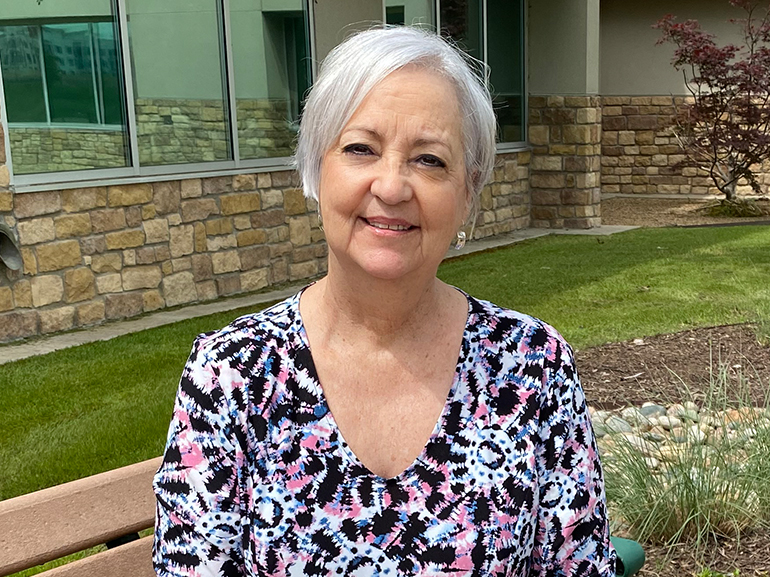Carla's Story

Carla Young, 64, and her husband, Tony, enjoy an active lifestyle traveling in their RV and spending time with their grandchildren. That all changed when Carla began experiencing a high fever, general discomfort and unrelenting back pain. She went to the local hospital, where she was diagnosed with COVID-19 and required ICU management for six days before discharging back home with her husband.
But it didn’t take long for Carla and her family to realize her fight with the virus wasn’t over when Tony was unable to wake her one morning. He called 911 and she was taken back to the hospital. Carla does not recall much from this time, but the medical team said her heart rate was in the thirties and it was a miracle she made it to the hospital. She was diagnosed with COVID-19 pneumonia in both lungs and hospitalized to receive IV antibiotics.
Once Carla stabilized, following eight days of hospitalization, she was ready for the next step in her recovery. Initially, she was hesitant to go to inpatient rehabilitation because she just wanted to return home. However, after speaking with her medical team, Carla knew it was her best option to regain strength and independence. After doing some research, Tony chose Select Rehabilitation Hospital of Denton. Following her first day, Carla said she felt “safe, comfortable and motivated to get stronger.”
When Carla first arrived, she was limited in what she could do and recalled, “I was so weak I could hardly walk and was dependent for almost everything.” She also had severe vertigo (dizziness), which created an extra layer of challenges. Her goals were to rebuild strength, return to walking and learn how to adapt her normal activities to match her current capabilities.
Physical therapists focused on exercises and strategies to improve her physical endurance, activity tolerance and strength required for walking with as much independence as possible. Activities included progressive gait training by increasing distance walked and lessoning supportive devices and physical assistance from clinicians. Therapists also utilized strategies and treatment to help reduce vertigo, which involves moving the head in certain positions related to gravity to move calcium deposits out of the semicircular canals in the inner ear. Carla noted these treatment sessions were difficult to tolerate but she felt immediate relief following therapy and her dizziness was mostly eliminated.
In occupational therapy, Carla’s therapists focused on improving her endurance and strength so she could independently complete basic daily tasks such as bathing, grooming, showering, toileting, dressing and transfers. Sessions focused on training of energy conservation strategies and utilizing adaptive equipment, such as a rolling walker, grab bars, etc. to accommodate for residual fatigue. Therapists incorporated an approach called activity tolerance training where they gradually increased the level of difficulty of daily tasks while reducing their level of assistance and frequency of rest breaks as Carla’s body tolerated. They also trained her to independently monitor symptoms and modify tasks as needed to safely complete activities at the most independent level possible.
During her time in the hospital, Tony was unable to visit Carla regularly due to COVID-19 visitation restrictions. This was one of the most difficult things for Carla. However, he provided support from afar and encouraged her to keep fighting. She said he is the reason she is alive today. Tony was able to attend family training to help prepare him for Carla’s return home. Tony and Carla were also educated on the strategy of energy conservation to prevent over-exertion while doing tasks.
After about 10 days of inpatient rehabilitation, Carla was discharged home and initiated outpatient therapy at the Select Rehabilitation Hospital Outpatient Center. Upon discharge, Carla had met all her physical therapy goals and was independent with bed mobility, transfers, was able to walk 400 feet with a rolling walker and go up and down 12 steps. She was also able to perform daily living tasks at a modified independent level, using adaptive equipment and modified approach as needed.
In outpatient therapy, physical therapists helped Carla continue to improve her balance, strength and endurance. They utilized various manual therapy techniques and kinesiotaping to address shoulder pain. They also used a recumbent stepper along with skilled resistive exercises to promote increased endurance to allow Carla to walk without assistive devices. Therapists also helped develop a home exercise program that Carla was able to work into her daily routine.
As pandemic restrictions diminished and Carla regained strength and mobility following outpatient therapy, she returned to more activities with her family such as going to watch her grandchildren play sports. Carla says that once she graduated from the walker she knew that she was on her way back to “her normal.”
Carla is looking forward to spending more time with her family and returning to RV trips with her husband. Reflecting on her experience at Select Rehabilitation, Carla said, “It was the most positive, life changing, positive experience of my life.” She encourages individuals to seek out help and to never ever give up. Carla says that through this experience she learned that “I’m a fighter, and I don’t give up.”